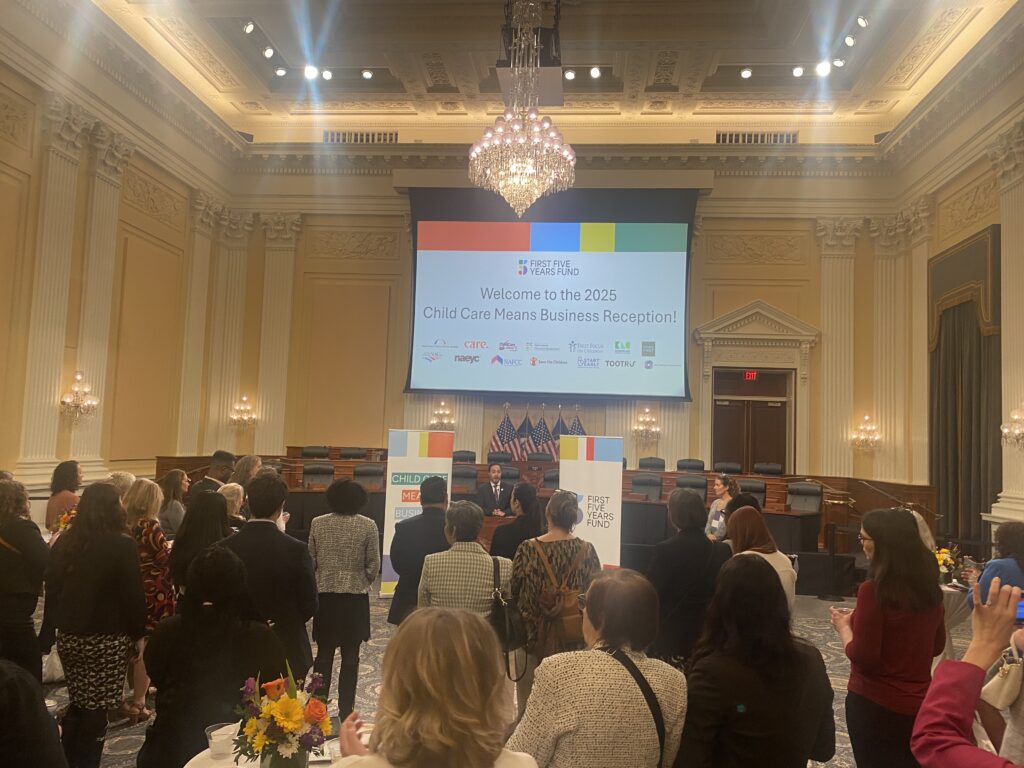House Ways and Means Committee Advances Two Critical Child Care Support Measures
WASHINGTON – Earlier today, the U.S. House Ways and Means Committee voted to approve two bills that would help improve access and affordability of quality child care opportunities for working families across the country: the Child Care Quality and Access Act of 2019 and the Economic Mobility Act of 2019. During the committee markup of the legislation, Democrats and Republicans spoke at length about the need to ensure more families – especially low-income families – have access to high-quality early learning and care opportunities.
“Being able to afford quality child care is absolutely essential for families who work hard to put food on the table and keep a roof over their heads,” said Sarah Rittling, executive director of the First Five Years Fund (FFYF). “And while the high cost of quality care is a burden most families struggle to face on their own, parents are the ones bearing the majority of expenditures for child care – particularly families with lower incomes who spend a significantly larger fraction of their paycheck on care. We are grateful for today’s committee vote to move these important bills forward for further bipartisan, bicameral conversations that will hopefully result in more funding for Child Care, and a strengthened Child and Dependent Care Tax Credit. Now is the time for lawmakers to continue working across the aisle to develop meaningful early learning solutions that support America’s young children and their families.”
ABOUT THE LEGISLATION
- The Child Care Quality and Access Act of 2019 would increase funding by $1 billion for the Child Care Entitlement to States (CCES) – the mandatory component of the Child Care and Development Block Grant (CCDBG) program. CCES was created as part of the 1996 welfare reform law, and currently directly appropriates $2.9 billion in annual mandatory child care funding for states to use with their own child care systems. Congress also provides additional discretionary CCDBG funding to states through the annual appropriations process. Currently, only about 15 percent of children eligible for child care assistance under federal eligibility parameters receive it due to underfunding.
- Included in the Economic Mobility Act of 2019 is a provision that would make the Child and Dependent Care Tax Credit (CDCTC) fully refundable to ensure it is available to low- and middle-income families with a lower or no tax liability. The bill would also double the amount of child and dependent care expenses that are eligible for the credit to $6,000 for one qualifying individual and $12,000 for two or more qualifying individuals. What’s more, the bill would also increase the amount of the exclusion for employer-provided dependent care assistance from $5,000 to $10,500. The Tax Policy Center found that nearly 40 percent of the CDCTC’s value is claimed by families earning $100,000 or more, while almost no families in lower tax brackets were able to access the credit. Learn more about the need to strengthen the CDCTC here.
This bill also makes the Child Tax Credit (CTC) fully refundable for families who currently make too little to receive the entire credit, expands the Earned Income Tax Credit (EITC) for workers without children, and expands dependent care flexible spending accounts.
Earlier this year, bipartisan leaders in the House and Senate, including Ways and Means Committee Members Rep. Stephanie Murphy (D-FL) and Rep. Jason Smith (R-MO), introduced similar legislation — the Promoting Affordable Childcare for Everyone (PACE) Act. The PACE Act would update CDCTC to make it refundable and increase its value to better reflect the drastic increases in the cost of child care since the credit was last updated nearly two decades ago.
BIPARTISAN COMMITTEE SUPPORT FOR CHILD CARE
During today’s markup of the bills, a number of Democratic and Republican members of the Committee spoke about the importance of supporting working families who are struggling with the cost of quality child care, including:
- “Today, we will take an important step in making sure working families have access to quality child care, a proven strategy to increase work force participation and reduce child poverty.”
“Increasing access to child care pays dividends. For every dollar spent, these programs can generate $6-10 in benefits to society. It’s hard to find investments with a better return than that.” – Chairman Richard Neal (D-MA) - “Even with the recent increases in appropriated funding, our federal investment in child care for working Americans is about the same as it was a decade ago adjusted for inflation. Promoting work, reducing child poverty, growing our economy, and supporting parents and grandparents… This sounds like the best kind of investment for me.” – Rep. Danny Davis (D-IL)
- “I think there is a lot of common ground here today, Mr. Chairman, when it comes to a commitment to make investments in child care. We want to work together to make sure there are targeted investments at the federal level and at the local level to make sure that children have the best opportunity to be raised in a safe, stable environment.” Rep. Tom Reed (R-NY)
- “As more parents participate in the workforce, child care has become a necessity for families. Child care is rapidly outpacing other expenses for families including the cost of higher education. With the high cost of child care, families are often forced to sacrifice quality or have no care at all. It is important that Congress acts to address the cost and quality of child care in this country.” – Rep. Darin LaHood (R-IL)
- “We know that child care plays a big role in a parent’s ability to work. We want to work across the aisle on this… I support efforts to increase access to safe, affordable child care, especially as an asset to allow parents to enhance employment opportunities.” – Rep. Brad Wenstrup (R-OH)
- “Under this proposal, low and middle income families will be able to claim the [CDCTC] for the first time, making the significant cost of child care more affordable for thousands of families in my district.” – Rep. Terri Sewell (D-AL)
- “What can we do to help kids living in poverty? The best thing we can do is help kids get an early start and make sure they have the opportunity to see the possibilities of a good future.” – Rep. Brad Schneider (D-IL)
High-quality, affordable child care is essential to supporting the education and healthy development of children from birth through age five while their parents work or attend school. Today, the cost of quality child care is greater than that of in-state college tuition in most American states. In fact, the average hourly cost of center-based care for a four-year old represents 24 percent of the median hourly wage across states. And only 15 percent of American voters say that most or all local programs available to lower- and middle-income families are high-quality and affordable. What’s more, those making over $100,000 per year are virtually just as likely as those who earn less than $40,000 per year to say that few programs near them are affordable and high-quality.
The First Five Years Fund is the leading bipartisan federal advocacy organization working to ensure all children from birth through age five have equal access to affordable, comprehensive, high-quality care and education to support their healthy development and help them achieve their full potential in school and life. FFYF seeks to expand federal support for all early learning and care opportunities that are high-quality and focused first on serving those children most-at-risk. http://www.ffyf.org
###
Subscribe to FFYF First Look
Every morning, FFYF reports on the latest child care & early learning news from across the country. Subscribe and take 5 minutes to know what's happening in early childhood education.



